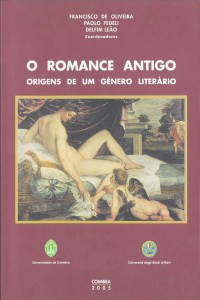Please use this identifier to cite or link to this item:
https://hdl.handle.net/10316.2/39245| DC Field | Value | Language |
|---|---|---|
| dc.contributor.author | Fialho, Maria do Céu | |
| dc.date.accessioned | 2016-08-02T15:43:30Z | |
| dc.date.accessioned | 2020-09-08T18:14:57Z | - |
| dc.date.available | 2016-08-02T15:43:30Z | |
| dc.date.available | 2020-09-08T18:14:57Z | - |
| dc.date.issued | 2005 | - |
| dc.identifier.isbn | 972-9057-21-4 | |
| dc.identifier.isbn | 978-989-26-1229-4 (PDF) | |
| dc.identifier.uri | https://hdl.handle.net/10316.2/39245 | - |
| dc.description.abstract | The sea-voyage of the Argonauts belongs to an old pattern of Hellenic narratives, even earlier than the Homeric Poems. Apollonius, in the Argonautics, rewrites the myth as an epos. His epos however, in spite of being heavily inspired on the Odyssey, shows a distancing from the genologic epic pattern in a number of ways: its structure, its portrayal of the characters, its narrative strategies. This points towards the novel. Apollonius already belongs to a period of book culture and of reading. As a matter of fact, the action begins ab ovo and it is characterised by the dissymetry of the four books. The theme of the voyage looses its preponderance in relation to love and magic. Jason reveals elements of an anti-hero when confronted with Medea, who is inluenced by the tragic patterns. The narrative is sometimes characterised by a heavy lyrical presence with an increasing intervention of a narrator who is emotionally envolved with the action and aware of his task. | eng |
| dc.language.iso | por | - |
| dc.publisher | Centro de Estudos Clássicos e Humanísticos | por |
| dc.relation.ispartof | http://hdl.handle.net/10316.2/39242 | por |
| dc.rights | open access | - |
| dc.title | Novas tendências narrativas nas Argonáuticas de Apolónio de Rodes | por |
| dc.type | bookPart | por |
| uc.publication.firstPage | 33 | - |
| uc.publication.lastPage | 47 | - |
| uc.publication.location | Coimbra | por |
| dc.identifier.doi | 10.14195/978-989-26-1229-4_3 | - |
| uc.publication.digCollection | PB | por |
| uc.publication.orderno | 3 | - |
| uc.publication.area | Artes e Humanidades | por |
| uc.publication.bookTitle | O romance antigo: origens de um género literário | - |
| uc.publication.manifest | https://dl.uc.pt/json/iiif/10316.2/39245/206003/manifest?manifest=/json/iiif/10316.2/39245/206003/manifest | - |
| uc.publication.thumbnail | https://dl.uc.pt/retrieve/11091320 | - |
| uc.publication.parentItemId | 54632 | - |
| uc.itemId | 69216 | - |
| item.grantfulltext | open | - |
| item.fulltext | With Fulltext | - |
| Appears in Collections: | O romance antigo: origens de um género literário | |
Files in This Item:
| File | Description | Size | Format | |
|---|---|---|---|---|
| novas_tendencias_narrativas_nas_argonauticas.pdf | 13.54 MB | Adobe PDF |  |
Items in DSpace are protected by copyright, with all rights reserved, unless otherwise indicated.
